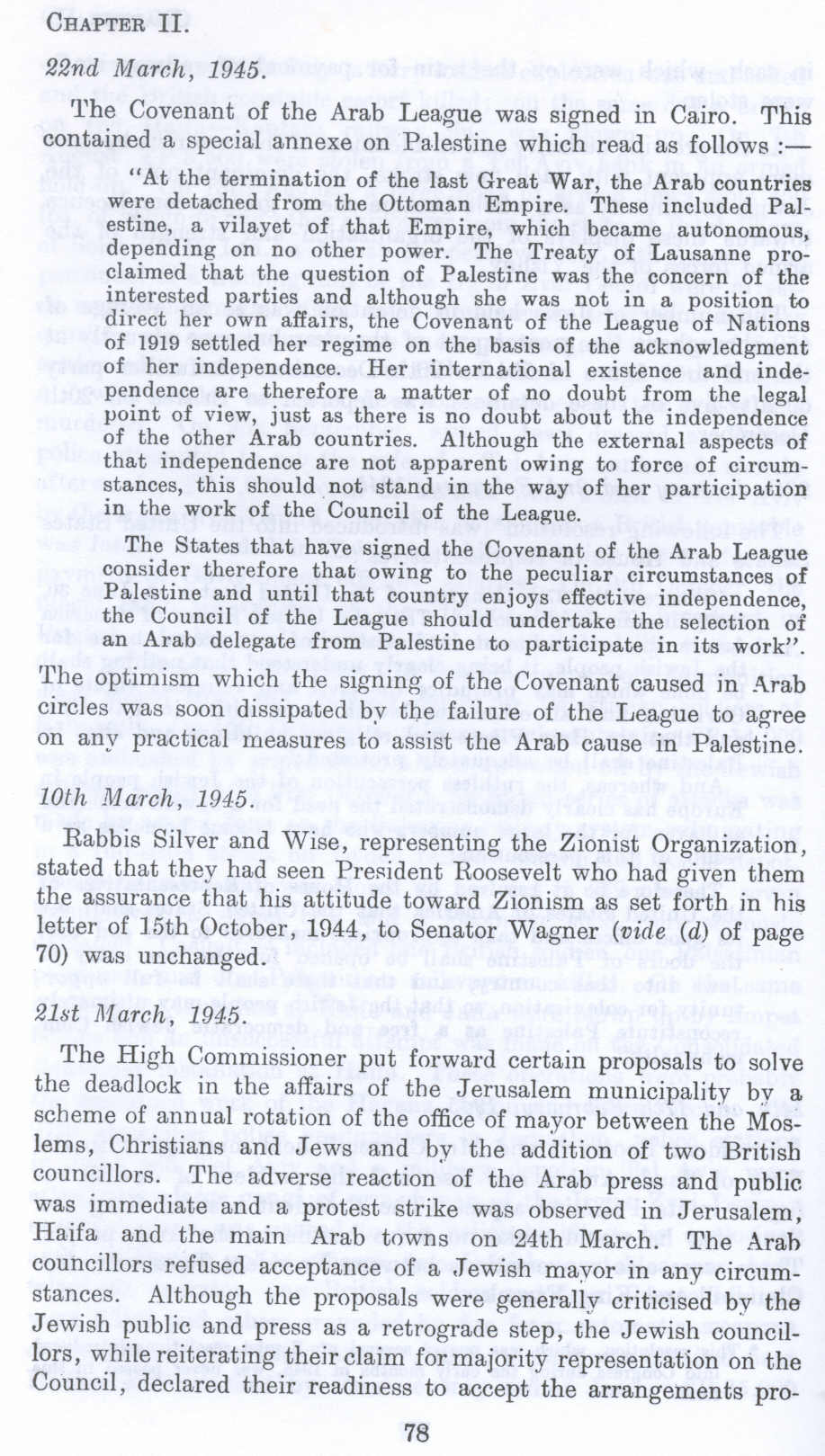| Prev | Next |  |
| Prev | Next |
| PalestineRemembered | About Us | Oral History | العربية | |
| Pictures | Zionist FAQs | Haavara | Maps | |
| Search |
| Camps |
| Districts |
| Acre |
| Baysan |
| Beersheba |
| Bethlehem |
| Gaza |
| Haifa |
| Hebron |
| Jaffa |
| Jericho |
| Jerusalem |
| Jinin |
| Nablus |
| Nazareth |
| Ramallah |
| al-Ramla |
| Safad |
| Tiberias |
| Tulkarm |
| Donate |
| Contact |
| Profile |
| Videos |
British Mandate: A Survey of Palestine: Volume I - Page 78. Historical Summary: Period IX: March, 1945. The agitation for a Jewish State and unrestricted immigration |
Disclaimer
The above documents, article, interviews, movies, podcasts, or stories reflects solely the research and opinions of its authors. PalestineRemembered.com makes its best effort to validate its contents.


Post Your Comment
*It should be NOTED that your email address won't be shared, and all communications between members will be routed via the website's mail server.
22nd March, 1945.
The Covenant of the Arab League was signed in Cairo. This contained a special annexe on Palestine which read as follows :-
11 At the termination of the last Great War, the Arab countries were detached from the Ottoman Empire. These included Palestine, a vilayet of that Empire, which became autonomous, depending on no other power. The Treaty of Lausanne proclaimed that the question of Palestine was the concern of the interested parties and although she was not in a position to direct her own affairs, the Covenant of the League of Nations of 1919 settled her regime on the basis of the acknowledgment of her independence. Her international existence and independence a.re therefore a matter of no doubt from the legal point of view, just as there is no doubt about the independence of the other Arab countries. Although the external aspects of that independence are not apparent owing to force of circumstances, this should not stand in the way of her participation in the work of the Council of the League.
The States that have signed the Covenant of the Arab League consider therefore that owing to the peculiar circumstances of Palestine and until that country enjoys effective independence, the Council of the League should undertake the selection of an Arab delegate from Palestine to participate in its work".
The optimism which the signing of the Covenant caused in Arab circles was soon dissipated by the failure of the League to agree on any practical measures to assist the Arab cause in Palestine.
10th, March, 1945.
Rabhis Silver and Wise, representing the Zionist Organization, stated that they had seen President Roosevelt who had given them the assurance that his attitude toward Zionism as set forth in his letter of 15th October, 1944, to Senator Wagner (vid.e (d) of page 70) was unchanged.
21st March, 1945.
The High Commissioner put forward certain proposals to solve the deadlock in the affairs of the Jerusalem municipality by a scheme of annual rotation of the office of mayor between the Moslems, Christians and Jews and by the addition of two British councilors. The adverse reaction of the Arab press and public was immediate and a protest strike was observed in Jerusalem, Haifa and the main Arab towns on 24th March. The Arab councilors refused acceptance of a Jewish mayor in any circumstances. Although the proposals were generally criticised by the Jewish public and press as a retrograde step, the Jewish councilors, while reiterating their claim for majority representation on the Council, declared their readiness to accept the arrangements proposed
Page 78